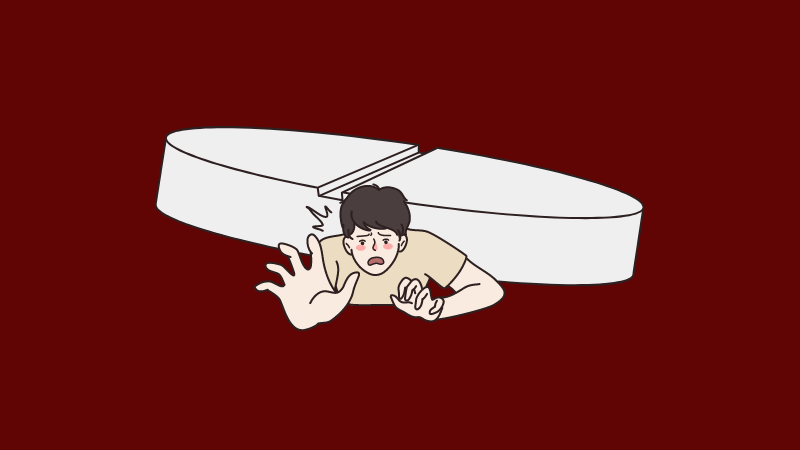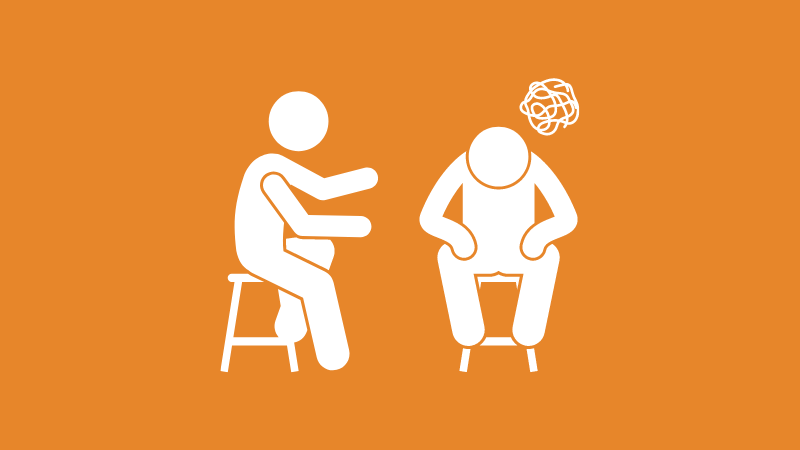Table of Contents
Affiliate link notice: As an affiliate of BetterHelp and other third-party vendors, We will receive compensation if you make a purchase using the links provided on this page. For more information, visit our disclosure page.
Last Updated on June 21, 2022 by Randy Withers, LCMHC
It’s never easy to see a family member or a loved one struggle with addiction.
Often, the person isn’t able to see or acknowledge the reality of the problem, prompting the need for a more direct approach.
This often involves the participation of those within the person’s immediate circle of friends and family.
We call this process an “intervention”.
Interventions provide an open and safe space for loved ones to express their feelings and concerns with the person suffering from addiction.
The main goal of an intervention is to eliminate denial and help the addicted person realize it’s time to get treatment.

According to the National Council on Alcoholism and Drug Dependence, a staggering 90% of individuals seek help after an intervention. So what goes into staging a successful one?
In this post, I’ll teach you how to prepare for an intervention that helps a person suffering from addiction to realize that they have a problem. And once they do, they’ll be far more willing to seek treatment.
How To Prepare For An Intervention In 6 Steps
Before you stage an intervention, make sure you get your ducks in a row. These things require planning, organization, and strategy.
1. Get Advice from an Expert
Before you organize an intervention, it’s a good idea to consult a professional first about how addiction works. It’s a complicated disorder, one not well understood by the general public. It’s only when you fully grasp the condition that you’ll be able to approach the afflicted individual with compassion and understanding.
There are two options on how to approach an intervention: organize one yourself or hire an Interventionist. The job of an Interventionist is to identify and involve the appropriate people to form what’s known as a recovery team. The goal of this team is to enable a path towards treatment and recovery for the individual suffering from addiction.
It doesn’t have to be an Interventionist, per se. A psychologist, mental health counselor, or a member of your faith community can also assist with the intervention. Whomever you choose, make sure that they are knowledgeable about addiction. It’s even better if the person is involved in the recovery community, though it’s not a requirement.
Once you have selected your professional support (i.e., The Interventionist), you’ll need to select social supports to make up the rest of your team.
2. Decide Who Will Participate
Your recovery team should include people who know the person with the addiction well enough to understand the exact nature and extent of the problem.
Close family members, friends, and colleagues are often a good place to start.
If any of these individuals are working their own program of recovery, give strong consideration to selecting them first. It helps having people on the team with firsthand knowledge of addiction.
Your Interventionist may not personally know the afflicted individual, but that’s okay. As a neutral third-party, they can provide objectivity and structure in what will be an emotionally charged meeting. This is analogous to the way a marriage counselor acts as a mediator and guide during a therapy session.
The ideal size of a recovery team is between three to six adults. A larger group might overwhelm the person, while a smaller group might not be taken seriously.
Having said that, there’s no definite rule on the number of participants for an intervention. What matters is that the person acknowledges the problem and agrees to start on the path to recovery.
Don’t include anyone who condones drug abuse or alcoholism in any way. Instead, select people who have the best interest of the addicted individual at heart. If you do hire an Interventionist, they can help you identify the right people for the job.
Now that you’ve assembled the team, it’s important that you meet to discuss the objective of the intervention and to gather information from each member.
3. Clarify the Extent of the Problem
Drug addiction and alcoholism are complex medical conditions that can manifest signs and symptoms in a variety of ways. The one common denominator, though, is an inability to stop the substance abuse which in turn creates other problems in the individual’s life.
Look at the ways that the person’s substance abuse has created havoc in their lives. Has their use affected their work or school performance? Have they lost friends or alienated family? Has their physical or mental health suffered? Have they endured any legal or financial challenges?
It’s easy to assume that what you see is the entire problem. In most cases, it’s just the tip of the iceberg. Have your recovery team develop a list of concerns based on their own observations.
Knowing the extent of the problem makes it easier for everyone to express their concerns and their sincere desire to help the person overcome their addiction. This also serves as an effective defense should your loved one try to minimize the scope of their problems.
It is easy to dismiss the concerns of one or two people. But a group of people all saying the same thing? That’s a different story.
4. Be Ready for an Emotionally Charged Discussion
You must prepare for intervention for it to actually work. As we’ve discussed, the recovery team needs to understand the nature of addiction and its consequences.
They also need to know about available treatment options. Depending on the severity of the problem, treatment can consist of the following:
- individual or group therapy;
- outpatient or inpatient rehab;
- hospitalization and medically-assisted detoxification.
- 12-Step Meetings (e.g., AA, NA) or SMART Recovery.
A licensed clinician can determine which option is best, but the team needs to be familiar with them as well. Ask your Interventionist for an overview. They will likely be able to identify specific programs by name.
The team also needs to prepare for the nature of the meeting itself. Interventions often come as a surprise to the suffering individual. They may feel attacked or threatened. They may be argumentive. They may cry. They may continue to deny they have a problem. It’s best to expect conflict and have a plan to deal with it should the need arise.
- Hold a rehearsal meeting to let everyone on the team practice what they’ll say.
- Have a volunteer role-play the conversation you want to have with your loved one.
- Have each member take turns expressing their feelings and concerns.
- Get feedback from each member about what worked well and what did not.
- Be mindful of body language and tone.
- Avoid accusatory language, but make your concerns clear.
Remember that your goal is to get this person to admit they have a problem and to agree to treatment. You do this by coming from a place of love and compassion. Threats don’t work. Stay focused on the solution and show them how much you care.
If tensions arise, the interventionist can provide much-needed direction and structure. They can help the team stay on task, field questions, and clarify the team’s concerns.
5. Know What you Plan to Say
People who struggle with alcoholism or drug addiction are often unable to see how their actions have hurt others. To that end, the group should come prepared to share their own stories and to explain how the addicted person has hurt them.
Everyone should know what they will say in advance, which is why I recommend a rehearsal. You can’t properly prepare for an intervention without having at least one.
During the rehearsal, members need to practice what they plan to say and listen to the stories from other members. That way, the group can ensure that their message is on point. Team members should be encouraged to give feedback to one another as well.
In an Intervention, clarity is essential. Each member of the recovery team needs to express the same basic message when it’s their turn to speak
- that their loved one is suffering;
- that their addiction is ruining their life;
- and that treatment must be sought immediately.
You can do this with personal stories, observations, and by expressing concern, but the team needs to have a unified message. It’s not a good idea to have a team member who plays the devil’s advocate or who tries to minimize the severity of the problem.
6. Have a Backup Plan
Even with rehearsals, there’s no guarantee that an intervention will work. It’s important to be flexible and to prepare for different scenarios that may play out.
During an intervention, the addicted person is not the only person who might inadvertently sabotage the process. Due to their emotional nature, it’s hard to predict how anyone will react.
Even with a seasoned Interventionist at the helm, tempers can flare. Most people avoid confrontation, but that’s exactly what an intervention is. The point here is that it’s an uncomfortable situation, so it’s wise to be ready for anything.
Have a plan. For example, if a family member loses their cool, have them step out of the meeting until they regain their composure. If the person with the addiction becomes defensive, take a step back and give them time to process their emotions.
As a team, it’s important to discuss these issues beforehand.
Even with preparation, sometimes it takes more than one intervention for the addicted person to take ownership of their problem and agree to seek help.
While this isn’t the outcome you had hoped for, it may nonetheless be an important first step in their journey to recovery. Don’t let a temporary setback discourage you. Addiction is a cunning and baffling disease, and issues like this are commonplace.
Final Thoughts
A successful intervention takes time to plan. If you don’t properly prepare for an intervention, it can lead to the addicted person feeling even more isolated.
Make sure that everyone on the recovery team speaks from a place of concern and love. And be patient with yourself and with the person who is struggling.
It may take several talks for them to finally seek treatment, so be strong and continue to do what’s best for your loved one.
And when they are ready to seek treatment, they’ll need your love and support even more. It can take years to fully recover from an addiction, as the disease affects so many facets of a person’s life.
The truth is, the intervention is just the first step of a much longer journey.
References
- Intervention: Help a loved one overcome addiction
- Planning an Intervention? 5 Things You Need to Know
- Intervention: The First Step In Addiction Recovery









Great post!
Thanks for the information that drug interventions are difficult due to the addicted person being avoidant to confrontation, so, it is wise to always prepare a plan B. This article is very helpful since these days, I’ve heard that addiction cases have increased due to the pandemic. I hope that services and programs are developed more to effectively confront people who need help.
You made a good point that it’s important to determine who will be participating when planning a drug intervention. I plan to arrange one for a close friend of mine because he has been dealing with substance abuse problems lately. I better also invite his sister and a few other people very close to him in order to be able to properly reach within him.